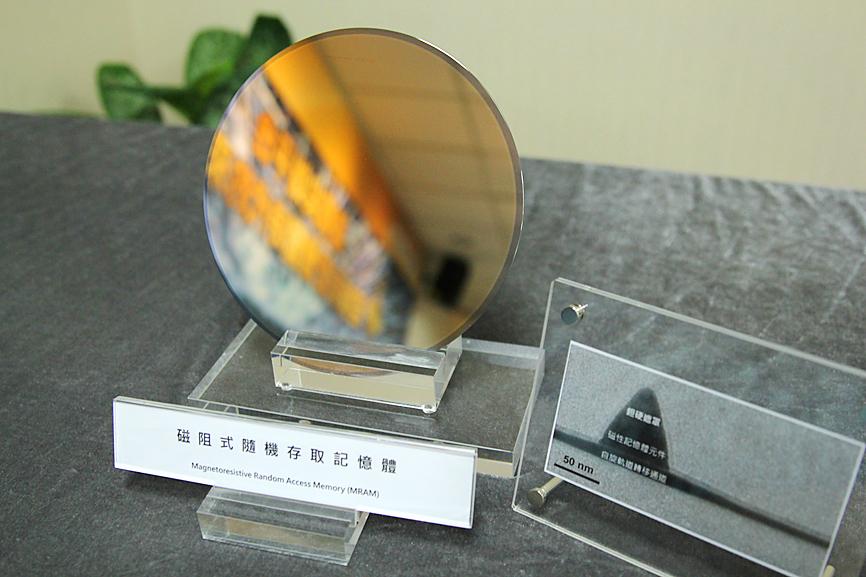The Taiwan Semiconductor Research Institute (TSRI) yesterday unveiled a new memory device it developed with university researchers, saying that they are the world’s second team after Intel to make the breakthrough.
Magnetoresistive random access memory (MRAM) is widely regarded as having the potential to become a mainstream device, TSRI Fabrication Service Division director Li Kai-shin (李愷信) told a news conference in Taipei.
To develop the device, global manufacturers have been working on various techniques, including spin-transfer-torque MRAM (STT-MRAM) and spin-orbit-torque MRAM (SOT-MRAM), although SOT-MRAM is still mostly in the research phase, he said.

Photo courtesy of the National Applied Research Laboratories
The institute has worked with local researchers to develop a SOT-MRAM device that can read data faster, while consuming less energy and undergoing any number of operations, than an STT-MRAM device, he said.
Their key breakthrough came by using a challenging technique called perpendicular magnetic anisotropy (PMA) to turn the magnetic poles vertically within the device, enabling them to develop a memory device that is smaller, he said.
After Intel, they are only the world’s second team to have achieved the breakthrough, Li said, adding that they published their findings in a paper for the Symposium on VLSI Technology and Circuits in June.
The manufacturing process involves the structuring of more than 30 layers of film, each of which only measures 0.4 nanometers, he said.
While Intel did not reveal the structural features of its device, the team clarified the physical mechanism involved in making the device, he added.
Other team members include National Tsing Hua University materials science and engineering professor Lai Chih-huang (賴志煌), National Taiwan University electrical engineering professor Liu Chee-wee (劉致為) and researchers at the Industrial Technology Research Institute (工業技術研究院).
The institute’s key equipment for developing MRAM include a physical vapor deposition system purchased from US firm Applied Materials and an etching system purchased from Japan, Li said.
Compared with semiconductor firms, the institute’s facilities might not contain the most state-of-the-art equipment, but students have learned through trial and error, and are prepared to work in the chip industry, Liu said.
The team’s breakthrough is significant, but it is difficult to say when the SOT-MRAM device might enter mass production, TSRI Deputy Director-General Shieh Jia-min (謝嘉民) said.
Asked whether the technique would be transferred to domestic manufacturers, Shieh said that it takes time for technology transfers, although the team hopes to engage with more local equipment and materials suppliers.
Based at the Hsinchu Science Park (新竹科學園區) with facilities in Tainan, TSRI is one of the eight laboratories under the National Applied Research Laboratories (NARL).
British Representative to Taiwan John Dennis met with NARL President Wu Kuang-chong (吳光鐘) to discuss semiconductor research and development in Taiwan, expressing the hope that the UK and Taiwan could expand their cooperation in tech-related industries, the British Office Taipei wrote on Facebook on Thursday.

A preclearance service to facilitate entry for people traveling to select airports in Japan would be available from Thursday next week to Feb. 25 at Taiwan Taoyuan International Airport, Taoyuan International Airport Corp (TIAC) said on Tuesday. The service was first made available to Taiwanese travelers throughout the winter vacation of 2024 and during the Lunar New Year holiday. In addition to flights to the Japanese cities of Hakodate, Asahikawa, Akita, Sendai, Niigata, Okayama, Takamatsu, Kumamoto and Kagoshima, the service would be available to travelers to Kobe and Oita. The service can be accessed by passengers of 15 flight routes operated by

MORE FALL: An investigation into one of Xi’s key cronies, part of a broader ‘anti-corruption’ drive, indicates that he might have a deep distrust in the military, an expert said China’s latest military purge underscores systemic risks in its shift from collective leadership to sole rule under Chinese President Xi Jinping (習近平), and could disrupt its chain of command and military capabilities, a national security official said yesterday. If decisionmaking within the Chinese Communist Party has become “irrational” under one-man rule, the Taiwan Strait and the regional situation must be approached with extreme caution, given unforeseen risks, they added. The anonymous official made the remarks as China’s Central Military Commission Vice Chairman Zhang Youxia (張又俠) and Joint Staff Department Chief of Staff Liu Zhenli (劉振立) were reportedly being investigated for suspected “serious

ENHANCING EFFICIENCY: The apron can accommodate 16 airplanes overnight at Taoyuan airport while work on the third runway continues, the transport minister said A new temporary overnight parking apron at Taiwan Taoyuan International Airport is to start operating on Friday next week to boost operational efficiency while the third runway is being constructed, the Ministry of Transportation and Communications said yesterday. The apron — one of the crucial projects in the construction of the third runway — can accommodate 16 aircraft overnight at the nation’s largest international airport, Minister of Transportation and Communications Chen Shih-kai (陳世凱) told reporters while inspecting the new facility yesterday morning. Aside from providing the airport operator with greater flexibility in aircraft parking during the third runway construction,

Taiwanese and US defense groups are collaborating to introduce deployable, semi-autonomous manufacturing systems for drones and components in a boost to the nation’s supply chain resilience. Taiwan’s G-Tech Optroelectronics Corp subsidiary GTOC and the US’ Aerkomm Inc on Friday announced an agreement with fellow US-based Firestorm Lab to adopt the latter’s xCell, a technology featuring 3D printers fitted in 6.1m container units. The systems enable aerial platforms and parts to be produced in high volumes from dispersed nodes capable of rapid redeployment, to minimize the risk of enemy strikes and to meet field requirements, they said. Firestorm chief technology officer Ian Muceus said